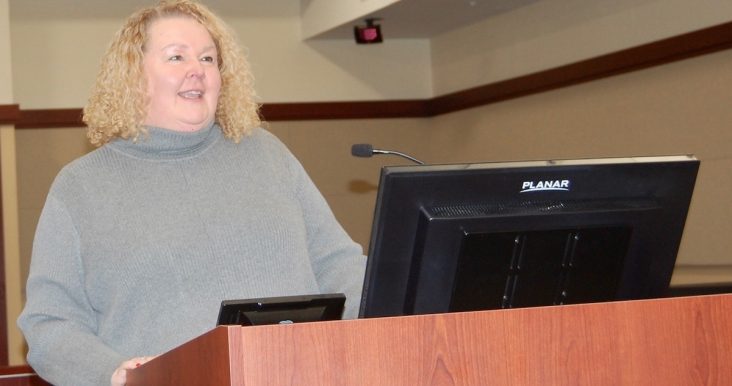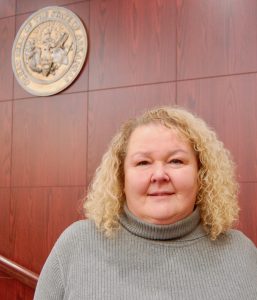Gilmer reflects on 35-plus years in the Sebastian County Circuit Clerk’s office
by December 27, 2022 5:03 pm 1,361 views

Sebastian County Circuit Clerk Cindy Gilmer will end her 35-plus year career in the office on Dec. 31.
Peggy Watson was the Sebastian County Circuit Clerk when Cindy Gilmer began working in the office. Gilmer, then a recent Ouachita Baptist University gradate, began her public career handling child support paperwork. That was more than 37 years ago.
Gilmer, now the Sebastian County Circuit Clerk, is set to retire Dec. 31. She worked her way up through the department and in 2008 was elected circuit clerk. Two years later she would be out of office when Ken Blevins was elected as Republican in what was a wave of Republican wins in offices up and down the ballot.
Blevins’ term proved to be a disaster that included several lawsuits and sexual harassment allegations. Blevins would be defeated in 2012 by Denora Coomer, who would hire Gilmer as her chief deputy. Coomer retired in December 2020, with the Sebastian County Quorum Court voting for Gilmer to fill out the term. Because she was filling out a term, Gilmer was not eligible to run for re-election. Susie Hassett was elected as the next circuit clerk.
“I have loved this job. It’s not something I expected to do when I graduated, but it has been fun,” Gilmer said in a recent interview with Talk Business & Politics about her 35 years working in the clerk’s office.
The job is arguably one of the most under appreciated in county government. The circuit clerk manages operations for seven Circuit Judges for the operation of the circuit courts in Fort Smith and Greenwood. The clerk also is tasked to provide accurate records to the public of court proceedings, maintain records, and ensure the orderly flow of paperwork through the various divisions of circuit court.
But wait, there’s more. Primary duties also include filing, docketing, attending court, issuing of notices, records management, and the reporting of various statistical information to the Administrative Office of the Courts. The clerk also prepares a list of prospective jurors, docket cases of the respective courts, issue summonses, subpoenas, writs and warrants related to each case, attend court and swear witnesses.

“There’s a lot we do every day, but I don’t think they see all the extra things we do,” Gilmer said when asked if many people understand how much a county’s circuit clerk office does to keep a civil society functioning. “And yes, I agree that probably a lot of what we do is not what people see, but it touches a lot of our lives. We’re not just handling a piece of paper and sticking it in a file. We have to look at it and see if it instructs us to do anything. Does it instruct us to satisfy a judgment, enter a judgment against somebody, or seal a case or seal a specific document? There are so many things that paper might instruct us to do.”
Gilmer has managed an office with 20 full-time employees and a budget of just over $1 million. She said the department has been well funded, but believes it needs a fourth criminal deputy to help support the caseload among the seven judges. She also said if anyone believes government workers aren’t busy, they should observe department employees for a few days.
“I wish people would not think that government workers just sit around and read books while they are paying us, because we absolutely don’t,” she said.
Gilmer also said technology has made operations more efficient, but also created more opportunities for new tasks. For example, the department has been engaged for more than two years to “cross reference documents” and do several other things to digitize cases before technology was in use. Some paper files may not have names of the parties, but will have a date and name of the ruling judge. They will use that info to complete and digitize the file so it is not only easily accessible for legal research, but is available for historic purposes, Gilmer said.
“It’s very tedious work, and it will take at least two more years to complete it all,” she said.
Her department also is working with the University of Arkansas at Fort Smith to scan in old court documents – some more than 100 years old – that have been collecting dust in storage. The process to digitize the old records began under Coomer.
“The papers are old, and delicate. I mean, many are well over 100 years old. They’ve been folded and have to be handled carefully to keep them from falling apart. … The (UAFS) students have to take precautions not to breathe the dust,” Gilmer said.
That job will also take several more years to complete.
Gilmer said she is most proud of the department’s staff who “do a great job” so they can best coordinate and collaborate with other players in Arkansas’ judiciary. Her advice to future clerks is to “document everything you do” so future leadership will be able to best understand why and how processes were changed. She also said it’s important to hire people who have a legal background so they understand legal language.
Her future plans will include travel. She professes to being a fan of visiting state and national parks. With a niece who lives in Las Vegas and a niece in Virginia, parks in and around those areas are likely near the top of the list, Gilmer said. She plans to remain based in Fort Smith and continue to be active in the Fort Smith Rotary Club.
In addition to missing working with her staff, the lawyers and the judges, Gilmer said she will miss not being in the know about legal happenings in the community.
“If you’re a nosy person, this is a great place to work,” she said with a laugh.
